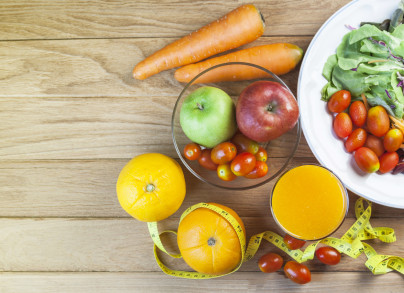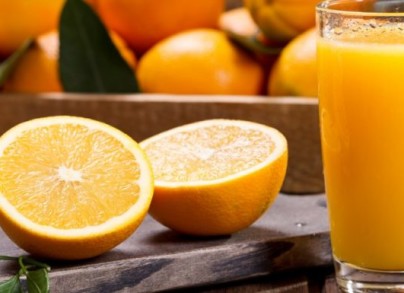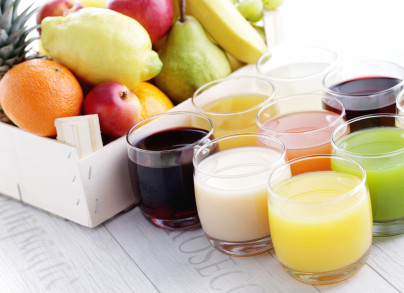Media & professional


Could citrus fruits protect against kidney stones?
Including citrus fruit juices in your diet could help keep your kidneys healthy. That’s according to a study in the journal, Nutrients, which explored relationships between citrus fruit juices (made from oranges, grapefruits, and lemons) and kidney stone disease.
The narrative review included 13 studies. Three of these were large-scale observational studies, which found that orange juice did not increase the risk for kidney stone disease. In 10 small-scale prospective clinical studies, orange juice, grapefruit juice, and lemon juice all increased levels of citrate, a substance which inhibits the crystallisation of kidney stone-forming salts in the urine.
Additionally, orange juice and grapefruit juice had an alkalising effect on urine pH. This is beneficial because highly acidic urine is linked to a range of health problems, including kidney stone disease.
Finding that citrus fruit juices are generally protective, the authors concluded that orange juice appears to protect against kidney stone formation, with lemon juice also having a protective role, albeit smaller. Furthermore, grapefruit juice played a protective role against kidney stone disease in small clinical studies.
This aligns with a 2021 systematic review and meta-analysis in the Journal of Nutrition, which assessed the effects of fructose-containing foods/drinks on uric acid – a blood marker linked to inflammation and gout. In controlled clinical trials where people consumed excess sugars, 100% fruit juice was found to reduce uric acid levels – which would be expected to lower the risk of gout, a painful joint disease.
Together, these studies suggest that citrus fruits and their juices could be protective for the kidneys, and help to keep uric acid levels under control.
References
Ayoub-Charette S et al. (2021). Different Food Sources of Fructose-Containing Sugars and Fasting Blood Uric Acid Levels: A Systematic Review and Meta-Analysis of Controlled Feeding Trials. The Journal of Nutrition. 151(8), 2409–2421.
Barghouthy Y, Somani BK (2021). Role of Citrus Fruit Juices in Prevention of Kidney Stone Disease (KSD): A Narrative Review. Nutrients. 13(11):4117.
3 min read

International polyphenol experts find diabetes benefit for citrus fruits
Whether whole or juiced, citrus fruits are a popular part of the diet globally, so it will come as welcome news that they could have a beneficial impact on diabetes risk. A new study in the journal Trends in Food Science & Technology investigated the short- and long- term effects of consuming citrus fruits, juices and their polyphenols on the risk of type 2 diabetes.
While eating fruit is good for long-term health, there has been debate about whether juices provide similar benefits. Fruit juice contains natural sugars – which come directly from the fruits. But it is also rich in vitamin C and contains potassium and polyphenols. The study authors set about critically evaluating the data from epidemiological and human intervention studies.
They found a short-lived positive effect of citrus polyphenols on blood sugar spikes after participants ate a meal or snack. Additionally, after drinking citrus juice for longer periods, people’s fasting glucose, fasting insulin and insulin resistance actually improved.
The authors suggest that the physiological response in humans may be affected by how well individuals absorb flavanones (a type of polyphenol), along with changes to their gut bacteria.
In their conclusion, they said, “On a positive note, despite its high intrinsic sugar content, moderate acute and chronic orange juice consumption does not seem to aggravate the glycaemic responses when compared to a sugar-sweetened beverage.”
Reference
Visvanathan R & Williamson G (2021). Effect of citrus fruit and juice consumption on risk of developing type 2 diabetes: Evidence on polyphenols from epidemiological and intervention studies. Trends in Food Science & Technology. 115, 133-146.
2 min read

Is orange juice anti-inflammatory?
Inflammation is a good thing in the right circumstances. For example, if you hit your elbow on a door and it swelled up, the soreness and stiffness would encourage you to rest it – which is what the elbow needs.
However, long term inflammation across the body is not a good thing as scientists believe it increases our risk of chronic diseases, such as heart disease, stroke and type 2 diabetes. Inflammation can also be a sign that our immune systems are under stress.
We still don’t know what causes chronic inflammation but there’s evidence that the following are linked:
· Frequent and excessive eating, particularly high fat diets or low intakes of antioxidant vitamins and minerals
· Regular overstimulation of the metabolism, for example eating lots of processed sugary or starchy foods which push up blood sugar levels
· Changes in gut bacteria linked to low fibre diets or antibiotic use
· Expansion of body fat cells due to obesity. This can cause rupturing of cells and an inflammatory response
· Fat cells becoming full leading to fat deposition in other parts of the body, such as the liver.
Fruits and vegetables have anti-inflammatory effects, and this may include orange juice. A recent review of 21 intervention studies, published in Advances in Nutrition (1), found that a common marker of inflammation – called interleukin-6 – reduced after people consumed 100% orange juice regularly.
The authors suggested the anti-inflammatory effect could be due to bioactive compounds in orange juice, such as the polyphenol hesperidin, which are believed to impact on genes that control inflammation.
In one of the better designed clinical trials mentioned in the review (2) adults drank a daily serving of red orange juice for 1 week. After a wash-out, the participants switched to a sugar-containing placebo drink for another week. Markers of inflammation, which included interleukin-6 and C-reactive protein, reduced significantly after orange juice consumption.
More studies like this are needed to confirm the potential anti-inflammatory effects of 100% orange juice.
Check out the references here:
3 min read

Sugar Awareness Week 8th to 14th November 2021
Surveys show that most people drink fruit juice for taste, or as a convenient way to obtain vitamins and minerals. 100% juices are rich in vitamin C, for immune health, and also provide potassium, which supports normal blood pressure, and folate, which helps to reduce tiredness and fatigue. Click here for Frequency Asked Questions about 100% fruit juices and sugar.
6 min read

